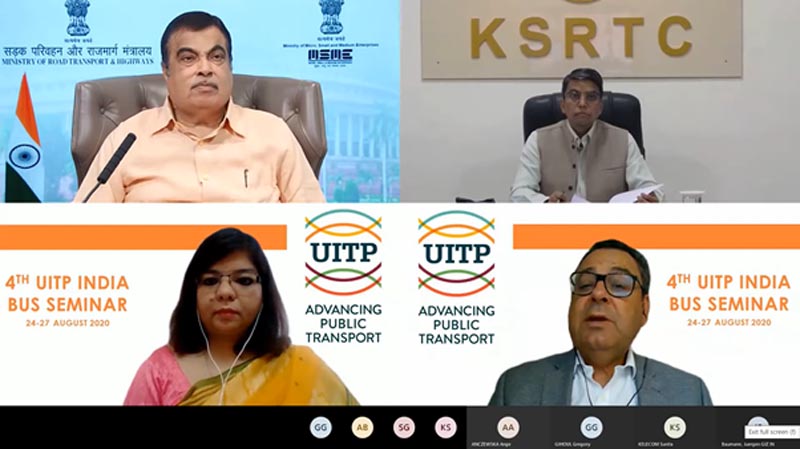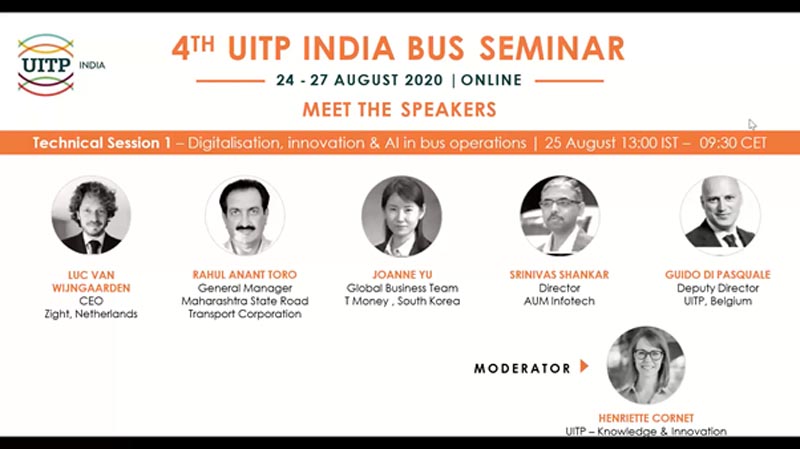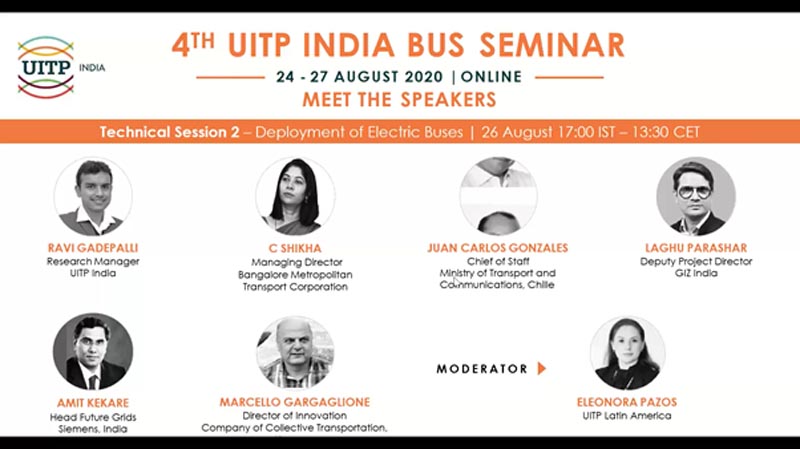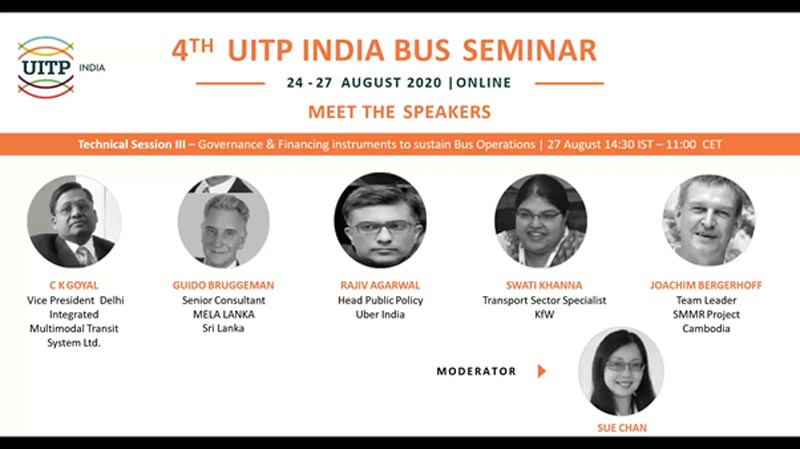The four-day seminar proved to be an important knowledge-sharing platform that had industry experts from across the globe providing deep insights into various aspects such as bus financing and operations, the integration of technology, effect of the ongoing pandemic on the sector, the need for new business models, etc.

UITP India successfully conducted the fourth bus seminar from August 24–28, 2020, which was organised online in partnership with Association for State Road Transport Undertaking (ASRTU) with lead sponsor GIZ India, session sponsors Aum Infotech, Siemens India and Uber, silver sponsor Volvo and media partner MOTORINDIA. The seminar got worldwide recognition with participation from 41 countries, more than 130 companies and 398 registrations with 44% registrations from outside India. Due to the precautionary measures for the ongoing pandemic, the seminar was conducted online, which in turn made countrywide and worldwide outreach possible while breaking the barriers of distance.
The participants included representation from state transport undertakings, private bus operators, financing institutions, ministries involved in the bus landscape of India and other industry players. It formed a platform for key national and international speakers to share their knowledge and experiences on various topics of pandemic and lockdown-driven impacts on the bus sector and the road to recovery based on innovation, digitalisation, artificial intelligence in bus operations, planning and designing for electric bus system, and governance and financing instruments to sustain bus operations.
Inaugural and Plenary Session
The bus seminar was inaugurated by Nitin Gadkari, Minister for Road Transport and Highways, along with Mohamed Mezghani, Secretary General, UITP. Mezghani welcomed the participants and conveyed a message about understanding the importance of buses in shouldering the pandemic’s impact while providing essential services, the economic benefits of buses and the need to move forward to better mobility with innovation, technology, legislative support and safety. In his keynote, Gadkari too emphasised on the need to modernise the public transport fleet and promote the use of green fuel like bio-CNG, ethanol and methanol while focusing on adopting best financial models for Indian cities.
The inaugural session was followed by the plenary session moderated by Ange Anczewska from UITP Australia and New Zealand. The speakers included Kim Shriner, Director, Department of Transport, Victoria, Australia; Shivayogi Kalsad, Managing Director, KSRTC; Arun Bothra, Managing Director, Odisha State Road Transport Corporation and Capital Region Urban Transport; and Abhishek Pathak, Managing Director and CEO of MP Enterprises.
The session was an interactive talk on the pandemic’s impacts on the bus sector and the road to its recovery based on the experience of the State road transport undertakings from the States of Odisha and Karnataka, experience from a private operator and also from international cities. The discussion also focused on the impact on finances with limited operations and revenue as well as the effect on patronage with limited capacity, future outlook and innovative revenue options.

Technical Session I
The second day was reserved for Technical Session I on ‘Innovation, Digitalization and Artificial Intelligence in Bus Operations’ moderated by Henriette Cornet from Knowledge and Innovation at UITP. The session included presentations and discussions from people involved in the industry worldwide. Luc Van Wijngaarden, founder of Zight, Netherlands, discussed the need for data-driven performance improvement in bus operations, focussing on the selection of KPIs aligned with the goals and enabling customisation. Representing Maharashtra State Road Transport Corporation (MSRTC), Rahul Toro spoke on the implementation path towards enabling digital payments in MSRTC, the thought process involved and future initiatives.
Joanne Yu from T Money Co. Ltd., South Korea, spoke on the integrated ticketing platform provided by T Money for seamless mobility in South Korea and the vast applications and future potential it can provide. S. Srinivas, founder of AUM Infotech, India, talked in detail about the factors that impact automatic fare collection projects in India, delving on the technical aspects involved. Guido Di Pasquale from UITP, Belgium, spoke on transitioning to mobility as a service, its ecosystem, models and future.

Technical Session II
Technical Session II of the seminar moderated by Eleonora Pazos, Head of Latin America, UITP, focused on ‘Planning and Deployment of Electric Bus System’. Ravi Gadepalli from UITP India provided insights into the e-bus industry story so far in India and the learnings which one can take from FAME I and II while looking forward to future investments. C. Shikha, Managing Director, Bangalore Metropolitan Transport Corporation, shared insights about the barriers faced for e-bus implementation in India along with pandemic-induced challenges. She also recommended enabling measures which may be taken up to accelerate the e-bus deployment process. Juan Carlos Gonzales from Ministry of Transport and Telecommunications (MTT), Chile, shared MTT’s experience of implementation of e-buses’ fleet and its promotion along with understanding its impact on users and the system.
Laghu Parashar from GIZ, India, shared details of the training needs’ assessment required for e-bus for the STUs in India on topics ranging from e-bus fundamentals, planning, strategy and monitoring to end-of-life scrapping and recycling. Amit Kekare from Siemens, India, provided details of the electric bus technology of the present and future with a focus on both buses and supporting infrastructure, including charging stations and depots. Lastly, Marcello Gargagalione from Uruguayan Company of Collective Transport Anonymous Society (CUTCSA), Uruguay, spoke about the key elements for decision-making in e-bus operation based on CUTCSA’s experience. He talked on topics ranging from business models, planning, real-time projects and the protocols required for fleet, charging and services.

Technical Session III
On the final day, i.e., the fourth day, Technical Session III was moderated by Sue Chan, Head of Asia Pacific, UITP, on ‘Governance and Financing Instruments to Sustain Bus Operations’. C. K. Goyal, Vice President at Delhi Integrated Multi-Modal Transit System, Delhi, spoke on data-driven performance monitoring of buses and also on contract monitoring based on learnings from the capital city of Delhi. Focusing on the GCC (gross cost contract) model, he provided details of various projects, including responsibilities, financing, fee payment, penalties and bonuses, use of technology, real-time alerts, bus management system performance analysis, etc.
Guido Bruggeman, MELA LANKA, highlighted facts about the public transport service contracts based on learnings from Europe and the approach that can be used for India. He discussed in detail experiences regarding service contract authority, tendering, funding, performance evaluation, legalities management, etc. Rajiv Aggarwal, Head of Public Policy, Uber, spoke about governance and performance monitoring through technology integration for mobility in India, including bus transit, multimodal transit integration and first and last-mile connectivity. Swati Khanna from KfW India, spoke on improving the readiness of government bus operators to attract low-cost financing. She focused on why financing for the bus sector is needed, the key challenges, key aspects of financing and the need to access this development financing.
Joachim Bergerhoff from Sustainable Mobility for Mid-Sized Metropolitan Regions (SMMR) project spoke about the need for bus financing and also the need for innovation with efficiency, governance, technology and design while also emphasising on transit-oriented development. The four-day seminar ended with wonderful insights shared by experts from the industry with tremendous response from the audience worldwide. The interactive sessions also had slots for taking up questions from the audience, which resulted in further productive discussions. The seminar formed a platform of knowledge-sharing which enabled people from different segments of the industry to come together.